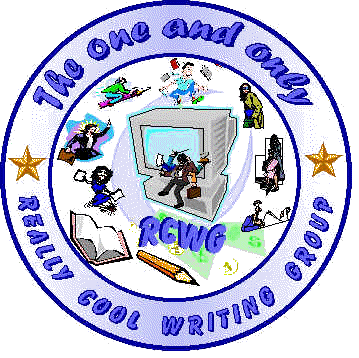![]()

RCWG, formally known as the Really Cool Writing Group, consists of six to eight writers who meet on a weekly basis in Seattle. The group is mentioned here because I still consider myself a member, despite my relocation to Fresno in 2002. RCWG was born in June 1995. In addition to myself, its founding members included John Zobel, Joanne Kuhns, Greg Hope, Tom Bresaw, and Terry Carstensen. The six of us met at a writing class at the University of Washington in September 1994. Over the next nine months, we learned, many times quite painfully, how essential it was to receive honest feedback about our work in progress. It was so essential, in fact, that we decided to carry on after the class had ended. Three of RCWG's six original members still remain. Numerous others have come and gone over the years, but the core's dedication ensures RCWG will continue to live long and prosper.
How does one go about keeping a critique group together for so many years? The most important factor is to ensure that all members make attendance a priority in their lives. Excuses, of course, remain endless: work, spouses, kids, sports, TV...Everyone can come up with a "legitimate" reason he or she cannot attend, but the bottom line is, each member must put forth their best effort to attend. Not everyone is able to write a new scene every week, but that isn't a reason to opt out. Associating with other writers on a regular basis is inspiring. All members' feedback is useful. Less an emergency, members must commit to attending every time the group meets. Sounds like hard work, I know. But keep in mind, it takes dedication to be a writer.
Perhaps a critique group isn't for every writer, though my experience would say that it should be. In any event, here are some tips for those of you who might be thinking about putting together a group of your own.
How do I know who is right for my group?
Listen to their work and compare it to your own. You'll know if they're a
match for your current skill level. Then listen to their criticism of your
work. Do they say only nice things? Only rotten things? If it's yes on
either count, they aren't what you're looking for. A good writer knows how
to listen, how to find something positive and negative to say about
another's work. While it might be a nice ego-booster to hear someone say,
"Wow, that's really great, I can't think of a thing you should change," it
won't help you one iota as far as improving your work.
How many other writers do I need?
There is no magic number. RCWG sets a minimum of five participants,
but on occasion has met with only three or four--or as many as nine or ten.
While the more the merrier can be a good thing insofar as the amount of
feedback received, it takes much longer to go around the table, and it's
nearly impossible for every person to read a scene.
What guidelines should I follow?
Your call. Some groups read aloud, others pass out their printed scene so
other members can read at their own pace. Personally, I feel it's important to
hear your scene; you'd be surprised how many repeats and awkward
sentences you discover. On the downside, when those critiquing stop to jot
down a note, part of the scene being read is lost to their ears. Members of
RCWG read their scene aloud and pass out hard copies so everyone
can follow along. A printed copy allows one to return to a section he/she
may have missed and reread it. This method calls for additional preparation
(not only do you have to write a scene, you have to go to the trouble and/or
expense of making copies), but it allows for a very in-depth critique.
How do we decide where to meet?
If someone in your group has evening access to an office, that would be your
best bet. A professional setting is a constant reminder that you mean
business. While it's true that a critique group is a social get-together,
its main purpose is to make you a better writer. The less you focus on the
social aspect, the more you'll accomplish. Meeting at someone's home is
fine, just make sure the snacks and gossip are secondary to the
critique session itself.
![]()